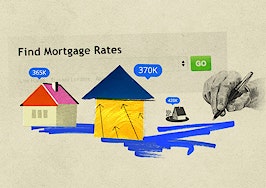The verdict is in — the old way of doing business is over. Join us at Inman Connect New York Jan. 23-25, when together we’ll conquer today’s market challenges and prepare for tomorrow’s opportunities. Defy the market and bet big on your future.
Falling revenue and an “uncertain U.S. housing market” took a toll on Opendoor in the third quarter of the year, driving revenue down and pushing profitability out of reach.
In total, the iBuyer brought in $980 million in revenue between July and September, according to a newly published earnings report. That’s down 71 percent compared to the same period in 2022. The company also lost $106 million in Q3. That’s an improvement over the third quarter of last year, when Opendoor lost nearly $1 billion — though a big part of that loss had to do with adjustments to the value of homes in the company’s inventory at the time.
However, Opendoor had managed to turn a profit of $23 million in the second quarter of this year. The Q3 results, however, show that the company was not able to parlay those results into a sustained profitability streak.

Carrie Wheeler
In the report, CEO Carrie Wheeler struck an optimistic tone, saying that the “results were in-line or ahead of our prior guidance driven by our continued focus on delivering operational excellence through pricing improvements, cost savings, and risk management.”
“These results demonstrate our continued strong execution and market share gains in what remains an uncertain U.S. housing market,” Wheeler continued. “With an improved cost structure, strong balance sheet, and scaled customer acquisition channels, we believe we have laid the foundation to emerge from this cycle more resilient and well-positioned for continued share gains and long-term profitability.”
In a call with investors Thursday afternoon, Wheeler said that the company is poised to “reaccelerate revenue next year.” She also said the company managed to gain market share despite a slower market.
Thursday’s earnings report additionally shows that Opendoor sold 2,687 homes in the third quarter of the year. That’s down 68 percent from the same time last year, and down 50 percent from Q2 of 2023.
The company bought 3,136 homes between July and September. That’s down 63 percent year over year, but up 17 percent compared to the second quarter of 2023. In a shareholder letter, the company pointed to that quarter-over-quarter increase as evidence that “despite average new listings being down 8 percent within our buybox in our markets,” Opendoor can still gain share.
Wheeler said during the call that Opendoor plans to increase acquisition volumes in 2024.
In a call with Inman late Thursday afternoon, Wheeler further explained Opendoor’s goal is to purchase 2,000 homes per month. Today the company is purchasing about 1,000 homes per month, so the objective is to double the acquisition rate in the coming year.
Ingredients for making that happen will include tapping into seasonal headwinds as the market exits the winter doldrums, as well as improved spreads — meaning the discount at which Opendoor is buying homes — which converts more consumers to customers. The company is also aggressively expanding partnerships, which it believes will let it do more volume in the near future.
Heading into Thursday’s earnings, Opendoor shares were trading in the low $2 range Thursday afternoon. That was up for the day and the week and represented a recovery after a dip in share price following the verdict in the Sitzer | Burnett bombshell commission trial.
Opendoor shares fluctuated, but generally trended down, on Thursday after the company published its earnings.

Credit: Google
Opendoor had a market cap of about $1.43 billion when markets closed Thursday afternoon.
Opendoor last reported earnings in August. In addition to reporting a profit at that time, the company revealed that it earned $2 billion in revenue between April and June. The massive loss of nearly $1 billion in that quarter was a huge spike compared to the same period one year earlier, when Opendoor lost $57 million.
However, the lion’s share of the loss — or $573 million to be exact — resulted from Opendoor adjusting the value of homes it had already purchased. Those adjustments were made as interest rates soared, sapping much of the momentum the housing market had enjoyed in 2021 and 2020.
At the time, Opendoor also predicted — correctly, it would turn out — that its numbers would improve as those homes from headier times gradually sold and the company balance sheet instead came to be dominated by properties purchased in the slower market after rates shot up.
Thursday’s earnings report also comes about a month after Opendoor announced a new partnership with eXp Realty. Earlier this year, Opendoor additionally teamed up with former rival Zillow to put the iBuyer’s cash offers on the portal company’s websites.
In a statement to Inman Thursday, Opendoor said that the Zillow partnership is now live in 45 markets across the U.S. The statement also noted that “acquisitions from our partnership channels increased 33 percent sequentially” in the third quarter and were up 76 percent compared to the first quarter of this year.
Wheeler concluded her remarks in the report by saying that “as the market-leading platform that is leveraging technology to transform and simplify the way people buy and sell their home, we have a significant opportunity ahead of us and remain steadfast in our mission to power life’s progress, one move at a time.”
During the investor call, Wheeler also weighed in on Sitzer | Burnett, which is just one of several antitrust cases that aim to challenge the way agents get paid. Wheeler noted that in Opendoor’s case, the company doesn’t earn any of its revenue from commissions paid to buyer’s agents. That makes Opendoor something of an anomaly in the real estate industry; traditional brokerages typically take a split from their agents’ commissions, while lead generation companies such as Zillow profit by charging agents for services — meaning they too ultimately rely on the money agents make for revenue.
In other words, most companies in the sector rely on agent commissions to make money.
However, Wheeler noted that in Opendoor’s case, buyer agent commissions are a cost Opendoor has to pay. As a result, she added, “If the buyer broker commission were reduced or went away, those costs to us would be reduced.”
She added that Opendoor is “well-positioned” to respond to “changes within the real estate ecosystem.”
Wheeler ultimately concluded the investor call Thursday by saying that the “housing market for sure continues to be challenging” but that Opendoor is “very focused on getting back to positive cash flow.”
Update: This post was updated after publication with additional information from Opendoor’s earnings report, commentary from the company’s call with investors, and other context.













